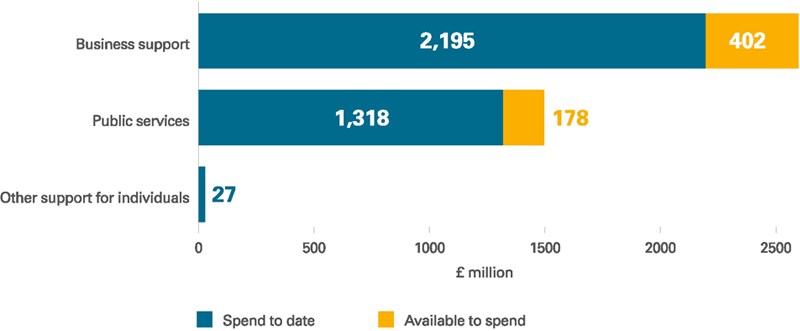Covid-19
Covid-19 has had far-reaching consequences for Scotland's public services and finances, and it will continue to have an impact in the future.
This e-hub brings together the Covid-19 related reports we've produced so far, as well as other resources.
Latest from our blog
Covid-19 has seen around £5.3 billion announced by the Scottish Government to tackle the impact of the pandemic.
Most of that spending has come from Barnett consequentials – extra funding that Scotland, Wales and Northern Ireland get if the UK Government decides to spend more in England on things that are devolved, such as health.
So far, the Scottish Government has broadly spent that money in the same way as its UK counterparts. And it’s made a good start on ensuring there’s transparency around how it’s been spent.
Fiona Diggle, Audit Manager

- Business support: 2,195 spend to date. 402 million available to spend.
- Public services: 1,318 spend to date. 178 million available to spend.
- Other support for individuals: 27 million available to spend.
Actual Government spend to date against announcements incorporated in the Summer Budget Revision - snapshot at the end of July. Scottish Government data suggests most of the funding in the Summer Budget Revision has been spent.
Covid-19 reports
Fiscal events and Covid-19 timeline
The Scottish and UK governments have had to respond quickly to the emerging pandemic.
The Covid-19 pandemic has been the biggest fiscal and policy challenge facing the Scottish Government over the past two decades of devolution. Expected devolved public spending has increased by around 15 per cent since the 2020/21 Scottish budget was first agreed in February 2020 and is subject to significant and continuing revision. Before the pandemic hit, the budget had faced unusual uncertainty with the UK budget being delayed due to the general election, and remains subject to unprecedented uncertainty, volatility and complexity.

Future Covid-19 audit work
Audit Scotland is committed to helping Parliament and the public understand how public money has been used during this crisis and ensure lessons are learned for the future. The complex and dynamic nature of the Covid-19 crisis means we will need to take a phased approach.
Phase 1 (short term)
- Briefing the Scottish Parliament on emerging audit risks linked to the public sector response to Covid-19.
- Considering what this means for our future work programme and the work of the Parliament’s Public Audit and Post Legislative Scrutiny Committee (PAPLS).
Phase 2 (medium term)
- Developing the work programme to consider the impact of Covid-19 on:
- specific sectors (eg, NHS, further and higher education, justice, local government)
- policy commitments (eg, early learning and childcare expansion, addressing child poverty)
- thematic issues raised by Covid-19 (eg, the impact on Scotland’s public finances, fraud risk management, inequalities).
Phase 3 (longer term)
- Identifying lessons that can be learnt from the public sector’s response.
- Assessing the outcomes achieved from key Scottish Government spending and programmes related to Covid-19.
- Aligning our work programme with the Scottish Government’s work to rebuild Scotland’s economy, remove inequality and advance wellbeing.
 Audit Scotland
Audit Scotland












